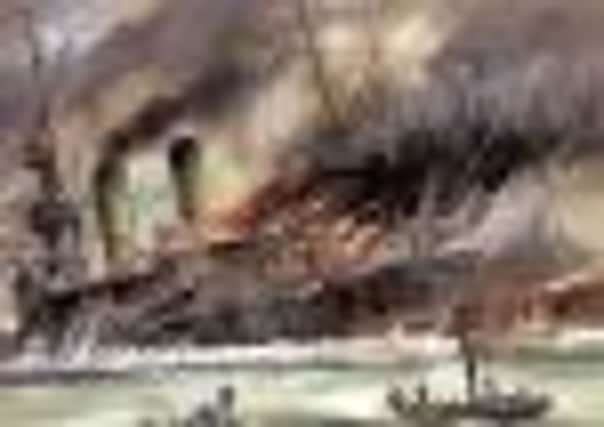Book review: From The Ruins Of Empire: The Revolt Against The West And The Remaking Of Asia, Pankaj Mishra


IN RECENT years there has been a distinct preponderance of history books which use non-Western sources to make problematic the “grand narrative” of the West’s supposedly inevitable dominance.
Among the best volumes are Tamim Ansary’s Destiny Disrupted and David Lewis’s God’s Crucible, which found the making of medieval Europe not in the fragmentation of the Roman Empire but the clash between the remnant of the Umayyad Caliphate in al-Andalus and the Franks.
Advertisement
Hide AdAdvertisement
Hide AdThis is not Orientalism through the looking-glass, but a systematic bid to give a more globalised account of momentous historical shifts. Pankaj Mishra’s From The Ruins Of Empire may well be seen in years to come as a defining volume of its kind. It is a startling book, providing a very different, and more intellectually intriguing view of imperialism than either Niall Ferguson’s bellicosely titled Civilization: The Six Killer Apps, or Jeremy Paxman’s tie-in Empire.
Mishra begins with a clever prelude: the defeat, by the Japanese, of the Russians in May 1905 in the Tsushima Strait. It was the first time, almost since the Battle of Lepanto in 1571, that a Western force had lost to a non-European power. Figures as diverse as Atatürk, Sun Yat-sen, Rabindranath Tagore, WEB Dubois, Abdurreshid Ibrahim, U Ottama and Gandhi all thought it an epoch-altering moment.
Lord Curzon, the most assiduous British imperialist, agreed. Mishra charts the progress of changing attitudes towards Western imperialism from the later 19th century, through the decolonisation of the post-War period, up to the present somewhat ambiguous resurgence of China and India as economic powers, and the Arab Spring. In various guises, imitation, competition, outright rejection and condescension have been strategies for how to cope with the “clash of civilisations” which we initiated.
The first two chapters are by far the most detailed, covering the careers of Jamal al-Afghani (1838-97) and Liang Qichao (1873-1929). Al-Afghani, an itinerant journalist, lecturer and polemicist, travelled across Egypt, Persia, India, Afghanistan and the Ottoman Empire analysing how the West had become a colonising power. Liang, briefly a significant aide to the Emperor Guangxu, wrestled with similar questions.
It was typical in the West to characterise non-European powers as indolent, moribund and ailing (even Marx referred to China as “the rotting semi-civilisation of the oldest State in the world”, and Hegel thought India “outside of world history”). Both al-Afghani and Liang sought to re-awaken national pride, even if that meant subsuming it within pan-Islamic or pan-Asian frameworks. President Woodrow Wilson’s Fourteen Points seemed to promise a more equitable future, and yet the hauteur of the “First World” powers at the Paris Conference was taken as a further slight, and outright hypocrisy on the part of the Americans.
Suspicion and resentment against the West at the moment is partially explained by its centuries-long history. The formation of the state of Israel obviously altered the geopolitical state of the Middle East, but it is less well known how it intrigued thinkers such as Al-e Ahmad: Israel offered a model of a modern, democratic and religious nation without the secularising drive that typified, say, Turkey.
Mishra’s book opens up new avenues of thought, and is so profuse in its ideas my only misgiving is that it is not twice as long. Both al-Afghani and Liang looked to a “Martin Luther” in their indigenous cultures; and it would be worth exploring what the non-European image of Christianity was. The linking of the originator of the Protestant Reformation with European hegemony in the East is fascinating both in terms of perceptions of the ossification of Islam and Confucianism and in pre-empting RH Tawney’s Religion And The Rise Of Capitalism.
Advertisement
Hide AdAdvertisement
Hide AdOften, the thinkers Mishra dwells on longest and even those he mentions en passant seem to be moving towards the ideas that get their fullest treatment in Frantz Fanon’s The Wretched Of The Earth (1961). Fanon was writing about Algeria, and it is striking that the modern philosophers most aligned with the deconstruction of the Enlightenment, Western and capitalist “grand narrative” – Derrida, Cixous, Foucault, Lyotard – all either came from or taught in Algeria. What is the feedback loop from the “oriental” back into Western philosophy?
Russia would also benefit from a fuller treatment. The preface is neatly done, except for Russia’s ambiguous relationship to “Europe” and the “West”. Dostoyevsky, a near contemporary of al-Afghani, ended his life on the extreme edge of the Slavophile tendency, which has sought to distance itself from the “Westernisers”. In the 20th century, the emergence of the USSR further distances it from the “European” narrative, just as China’s turn to Communism distanced it from the nationalist inflected Communisms in Burma, Laos and Vietnam.
One can only be thankful for writers like Mishra. From The Ruins Of Empire is erudite, provocative, inspiring and unremittingly complex; a model kind of non-fiction for our disordered days.
Edinburgh International Book Festival, 26 August, 12.30pm. www.edbookfest.co.uk